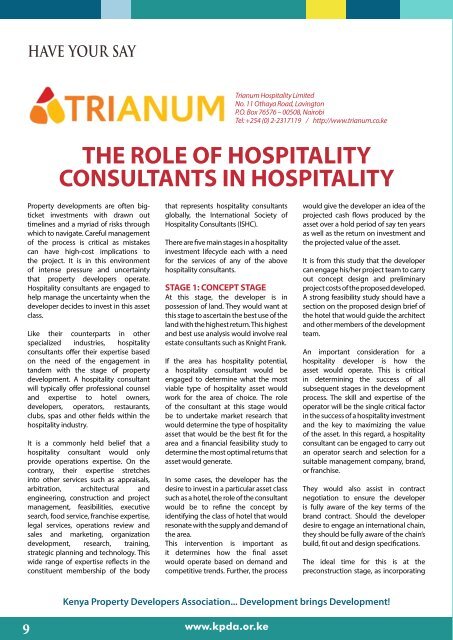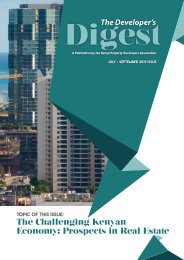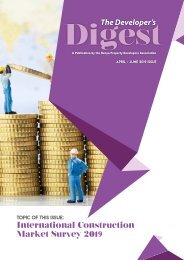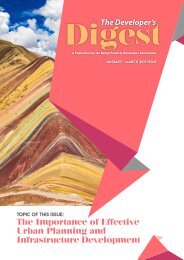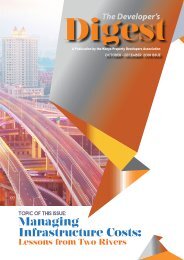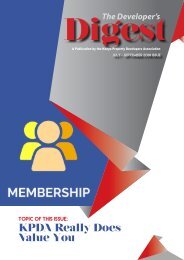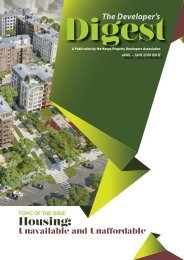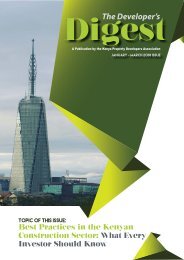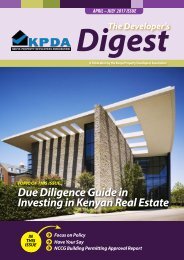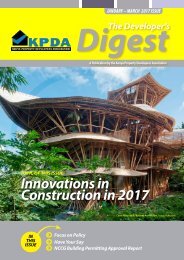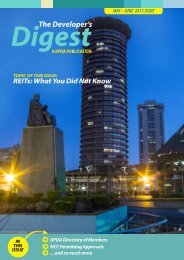The Developer's Digest, August - September 2017 Issue
Create successful ePaper yourself
Turn your PDF publications into a flip-book with our unique Google optimized e-Paper software.
HAVE YOUR SAY<br />
HAVE YOUR SAY<br />
Property developments are often bigticket<br />
investments with drawn out<br />
timelines and a myriad of risks through<br />
which to navigate. Careful management<br />
of the process is critical as mistakes<br />
can have high-cost implications to<br />
the project. It is in this environment<br />
of intense pressure and uncertainty<br />
that property developers operate.<br />
Hospitality consultants are engaged to<br />
help manage the uncertainty when the<br />
developer decides to invest in this asset<br />
class.<br />
Like their counterparts in other<br />
specialized industries, hospitality<br />
consultants offer their expertise based<br />
on the need of the engagement in<br />
tandem with the stage of property<br />
development. A hospitality consultant<br />
will typically offer professional counsel<br />
and expertise to hotel owners,<br />
developers, operators, restaurants,<br />
clubs, spas and other fields within the<br />
hospitality industry.<br />
It is a commonly held belief that a<br />
hospitality consultant would only<br />
provide operations expertise. On the<br />
contrary, their expertise stretches<br />
into other services such as appraisals,<br />
arbitration, architectural and<br />
engineering, construction and project<br />
management, feasibilities, executive<br />
search, food service, franchise expertise,<br />
legal services, operations review and<br />
sales and marketing, organization<br />
development, research, training,<br />
strategic planning and technology. This<br />
wide range of expertise reflects in the<br />
constituent membership of the body<br />
that represents hospitality consultants<br />
globally, the International Society of<br />
Hospitality Consultants (ISHC).<br />
<strong>The</strong>re are five main stages in a hospitality<br />
investment lifecycle each with a need<br />
for the services of any of the above<br />
hospitality consultants.<br />
STAGE 1: CONCEPT STAGE<br />
At this stage, the developer is in<br />
possession of land. <strong>The</strong>y would want at<br />
this stage to ascertain the best use of the<br />
land with the highest return. This highest<br />
and best use analysis would involve real<br />
estate consultants such as Knight Frank.<br />
If the area has hospitality potential,<br />
a hospitality consultant would be<br />
engaged to determine what the most<br />
viable type of hospitality asset would<br />
work for the area of choice. <strong>The</strong> role<br />
of the consultant at this stage would<br />
be to undertake market research that<br />
would determine the type of hospitality<br />
asset that would be the best fit for the<br />
area and a financial feasibility study to<br />
determine the most optimal returns that<br />
asset would generate.<br />
In some cases, the developer has the<br />
desire to invest in a particular asset class<br />
such as a hotel, the role of the consultant<br />
would be to refine the concept by<br />
identifying the class of hotel that would<br />
resonate with the supply and demand of<br />
the area.<br />
This intervention is important as<br />
it determines how the final asset<br />
would operate based on demand and<br />
competitive trends. Further, the process<br />
Trianum Hospitality Limited<br />
No. 11 Othaya Road, Lavington<br />
P.O. Box 76576 – 00508, Nairobi<br />
Tel: +254 (0) 2-2317119 / http://www.trianum.co.ke<br />
THE ROLE OF HOSPITALITY<br />
CONSULTANTS IN HOSPITALITY<br />
would give the developer an idea of the<br />
projected cash flows produced by the<br />
asset over a hold period of say ten years<br />
as well as the return on investment and<br />
the projected value of the asset.<br />
It is from this study that the developer<br />
can engage his/her project team to carry<br />
out concept design and preliminary<br />
project costs of the proposed developed.<br />
A strong feasibility study should have a<br />
section on the proposed design brief of<br />
the hotel that would guide the architect<br />
and other members of the development<br />
team.<br />
An important consideration for a<br />
hospitality developer is how the<br />
asset would operate. This is critical<br />
in determining the success of all<br />
subsequent stages in the development<br />
process. <strong>The</strong> skill and expertise of the<br />
operator will be the single critical factor<br />
in the success of a hospitality investment<br />
and the key to maximizing the value<br />
of the asset. In this regard, a hospitality<br />
consultant can be engaged to carry out<br />
an operator search and selection for a<br />
suitable management company, brand,<br />
or franchise.<br />
<strong>The</strong>y would also assist in contract<br />
negotiation to ensure the developer<br />
is fully aware of the key terms of the<br />
brand contract. Should the developer<br />
desire to engage an international chain,<br />
they should be fully aware of the chain’s<br />
build, fit out and design specifications.<br />
<strong>The</strong> ideal time for this is at the<br />
preconstruction stage, as incorporating<br />
brand specifications mid construction<br />
would have huge cost implications.<br />
Local consultants that are able to offer<br />
these services include Jones Lang<br />
LaSalle (which has a global footprint),<br />
Barefoot Consultancy, Trianum and PKF.<br />
International consultants may include<br />
HVS (South Africa, UK, UAE, USA & Asia),<br />
W Hospitality (Nigeria), Colliers (UAE),<br />
HTI Consulting (UAE) among others.<br />
STAGE 2: DESIGN STAGE<br />
In the process of detailing the project’s<br />
designs, there will need to use a<br />
hospitality consultant to refine the<br />
hospitality concept with a special focus<br />
on areas related to operation flow<br />
such as the kitchen and laundry. <strong>The</strong><br />
advice provided would serve to balance<br />
aesthetics, functionality, and workflow<br />
based on certain ratios that guide<br />
space allocation between the back of<br />
house staff areas, guest spaces and the<br />
interaction of hotel rooms to food and<br />
beverage space across the different<br />
asset ratings.<br />
<strong>The</strong>se ratios and the final workflow and<br />
guest circulation have a direct impact<br />
on the profitability of the asset. It is<br />
not uncommon for the project scope<br />
to change, hence, the developer may<br />
also choose to reach out to a hospitality<br />
consultant for concept refinement.<br />
<strong>The</strong> consultants’ role would be to work<br />
with the defined concept to ensure<br />
maximized efficiencies of the building.<br />
This may involve some construction<br />
reworks though checks are required<br />
to avoid high-cost escalations. <strong>The</strong><br />
hospitality consultant would join the<br />
developer’s core project team to provide<br />
their expertise on space optimization<br />
and workflow that increases profitability.<br />
Hotel operators and independent<br />
consultants, especially senior hospitality<br />
managers, would be able to provide<br />
these services since experience in<br />
operations are paramount in giving the<br />
right advice.<br />
A legal consultant may help define the<br />
contractual interaction between various<br />
operators in cases where spaces within<br />
one asset have different operators such<br />
as specialized spa or health and fitness<br />
operators, specialty restaurants or bars<br />
or casinos.<br />
STAGE 3: CONSTRUCTION STAGE<br />
As mentioned earlier, it is best to start<br />
with the end use of the asset in mind and<br />
select an operator, brand or franchise<br />
at the conclusion of the feasibility<br />
study before the detailed design and<br />
commencement of construction.<br />
In cases where this was not determined<br />
at an earlier stage, the developer may<br />
require an operator introduced once<br />
construction is in progress.<br />
<strong>The</strong> determination whether the property<br />
would be under a management<br />
contract, owner operated or leased<br />
to a hospitality operator requires the<br />
expertise of hospitality consultants who<br />
are able to present the contractual and<br />
financial implications of the various<br />
business models by projecting the cash<br />
flows between the parties.<br />
Local firms such as JLL, Unlimited<br />
Directions and Trianum with experience<br />
in negotiation and administering<br />
management contracts may be best<br />
placed to handle this task. Additionally,<br />
during the construction period, a<br />
hospitality consultant can be engaged<br />
to procure furniture, fittings and<br />
equipment (FF&E) in accordance with<br />
the operator’s standards.<br />
Many international brands have very<br />
detailed brand specifications that are<br />
not easy to meet within the local market<br />
hence requiring international sourcing<br />
and long lead times. Consultants such as<br />
Turea (Kenya), Hotel Spec (South Africa)<br />
and WATG (UK) offer these services and<br />
work closely with interior designers and<br />
operators to purchase the right quality<br />
and quantity of items.<br />
STAGE 4: PRE-OPENING STAGE<br />
Once construction of the hospitality<br />
asset is complete, handed over and the<br />
FF&E is in place, it is the time to put all<br />
the final pieces together. This includes<br />
the procurement of operating supplies<br />
and equipment (OSE), installation<br />
of information, communication and<br />
technological (ICT) as well as financial<br />
systems, establishing of procuring<br />
licenses and permits and hiring and<br />
training of staff to be able to deliver the<br />
required level of service.<br />
Again, hotel operators and independent<br />
consultants, especially senior hospitality<br />
managers, would be able to provide<br />
these services. In addition, specialized<br />
consultants like OKAL or HVS Executive<br />
Search for training and recruitment or<br />
Hospitality Systems Consultants (HSC)<br />
for ICT system set up may be required.<br />
STAGE 5: MANAGEMENT<br />
AND EXIT STAGES<br />
Hospitality consultants help the investor<br />
achieve their objectives by de-risking the<br />
development in the early development<br />
stages; however, making the investment<br />
viable during its operation life cycle<br />
is what ensures achievement of the<br />
owner’s objectives and maximization of<br />
returns.<br />
If an operator is managing the day-today<br />
operations under a management<br />
contract, then the role of asset managers<br />
like CHM (USA) and valuation specialists<br />
like HVS (South Africa) and JLL (Kenya)<br />
is crucial in tracking performance and<br />
developing strategies for continuation<br />
or exit. <strong>The</strong>se firms can also handle the<br />
valuation and brokerage should exit<br />
become necessary.<br />
In conclusion, the role hospitality<br />
consultants play in the development<br />
of hospitality assets depends on the<br />
requirements of the developer; however,<br />
it is best to engage a consultant at the<br />
start of the project to minimize both<br />
development and operating costs and<br />
risks, which in turn lead to higher returns.<br />
By Samantha Muna, Managing Director<br />
Robert Kimani, Business Development<br />
Executive<br />
Kenya Property Developers Association... Development brings Development!<br />
Kenya Property Developers Association... Development brings Development!<br />
9<br />
10


